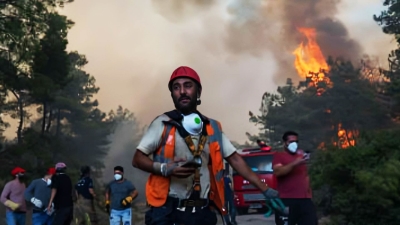Role of private sector in facing climate change
Mai El-Kafoury

The private sector plays a pivotal role in the issue of climate change and promoting the trend towards sustainable development, through many practices, whether by helping to fill the adaptation financing gap, embracing the idea of an environmentally sustainable products, or even helping the international community to scale up adaptation to climate change that worsens year after year.
In a recent IMF report, the International Monetary Fund (IMF) has called for increased private sector climate investment, especially for emerging countries, to reach the target of net zero emissions by 2050. Data indicate that it is necessary to invest about $2 tn annually by 2030, according to data released by the International Energy Agency (IEA).
The most important tool that the private sector can pursue to strengthen this role is to allocate part of its investment to support research and development in order to move towards clean technology, set targets for reducing carbon emissions and work towards them through initiatives, as well as prioritize projects that support renewable energy, and work to develop green infrastructure.
It is essential that the private sector and government agencies cooperate. To become hand in hand, and the process of harmonization takes place between them where the Government can contribute to infrastructure development, Facilitating actions for certain projects that support the preservation of the environment, as well as giving financial incentives to the sector to encourage it towards green projects; The obligation for companies to report on an ongoing basis and their impact on the environment in addition to granting facilities to companies for funding that support environmental projects, Thus, we will find that the private sector is raising investment to cope with climate change.
COP 28 strengthened the role of the private sector in addressing the climate crisis, achieving many important outcomes and initiatives, notably the Global Climate Fund, and the issue of addressing mitigation and adaptation to the impacts of climate change, while emphasizing the need to invest in adaptation and mitigation, in order to build climate-resilient societies, according to Mardini, Director of UNICEF's Private Fundraising and Partnerships Division.
The total contributions to UNICEF amounted to about $9.3 bn, in which the private sector had participated about $3.1 bn. In order to advance climate action, it was necessary to examine issues in a practical manner, with sustainability and raising capital to give the private sector the opportunity to move from SMEs to large enterprises.
Despite those great efforts, there are obstacles and challenges that may stand in the way of achieving this. such as the occurrence of economic crises, which in turn directly affect the work of the private sector, It works to reduce its investments for environmental and green technology projects due to a deficit in financial liquidity as well as changing the sector's direction of interest during crises, focusing on rapid profit rather than investing in time-consuming projects for financial returns.












